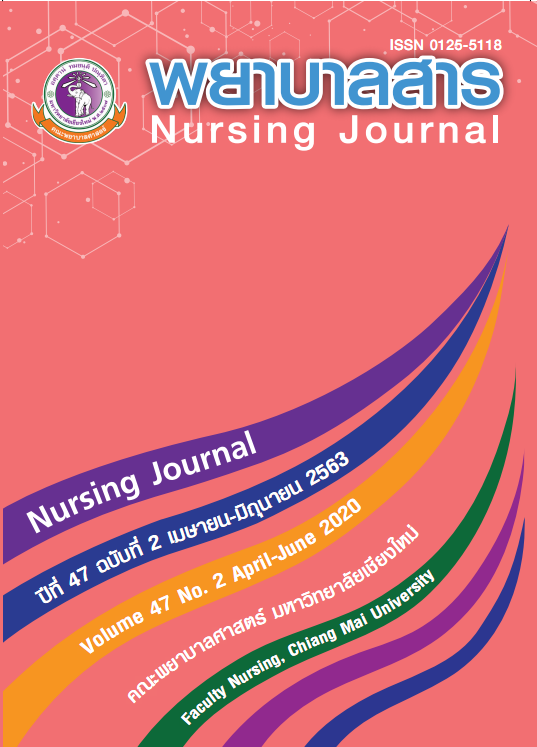Stress, Social Support and Postpartum Depression among First-time Mothers
Keywords:
Stress, Social Support, Postpartum Depression, First-time MothersAbstract
Postpartum depression affects the physical and psychological health of mothers, infants and families. The purpose of this descriptive correlational research study was to explore stress, social support and postpartum depression among first-time mothers. The subjects were selected following the inclusion criteria and consisted of 85 expectant first-time mothers who received postnatal four week check-up at Chiang Rai Hospital and Chiang Mai Health Promotion Hospital from March to July 2014. The research tools were the Suanprung Stress Test developed by Mahatnirunkul, Pumpaisalchai & Tapanya (1997), the Mother Social Support Questionnaire developed by Nalinee Sitthiboonma, Kannika Kantaruksa and Bungorn Supavititpatana based on the social support concept of House (1981) and literature reviewed, and The Edinburgh Postnatal Depression Scales developed by Cox, Holden, and Sagovsky (1987), which was translated into Thai by Pitanupong, Liavsuetrakul & Vittayanont (2006). Descriptive statistics and Pearson's product moment correlation were used to analyze the data.
Results of the study revealed that:
- The first-time mothers had moderate stress 64.71% and severe stress 24.71%.
- The first-time mothers had high social support 54.12%.
- The first-time mothers had postpartum depression 57.65%.
- Stress had moderate positive correlation with postpartum depression (r = .463, p < .01) while social support had no statistically significant correlation with postpartum depression.
The research findings suggest that screening for stress, social support, and postpartum depression among first-time mothers should be done so midwives can refer those who have high stress level, lack of social support and have postpartum depression for appropriate care.
References
Beck, C. T. (2002). Postpartum depression: A metasynthesis. Qualitative Health Research, 12 (4), 453-472.
Bigelow, A., Power, M., MacLellan-Peters, J., Alex, M., & McDonald, C. (2012). Effect of mother/infant skin-to-skin contact on postpartum depressive symptoms ad maternal physiological stress. J Obstet Gynecol Neonatal Nurs, 41 (3), 369-382.
Boyd, R. C., Zayas, L. H., & McKee, M. D. (2006). Mother-infant interaction, life events and prenatal and postpartum depression symptoms among urban minorit y women in primary care. Maternal and child health journal, 10(2), 139-148.
Chaaya, M., Campbell, O. M. R., Kak, F. EL., Shaar, D., Harb, H., & Kaddour, A. (2002). Postpartumdepression: Prevalence and determinants in Lebanon. Arch Womens Ment Health, 5 (2), 65-72.
Corwin, E. J., Bownstead, J., Barton, N., Heckard, S., & Morin, K. (2005). The impact of fatigue on the development of postpartum depression. J Obstet Gynecol Neonatal Nurs, 34 (5), 577-586.
Cox, J. L., Holden, J. M., & Sagovsky, R. (1987). Detection of postnatal depression: Development of the 10 item Edinburgh Postnatal Depression Scale. The British Journal of Psychiatry : the Journal of Mental Science, 150, 782-786.
Davison, M. R., London, M. L., & Ladewing, P. W. (2012). Maternal newborn nursing & women’shealth (9 th Ed.). New Jersey: Pearson Education Inc.
Devey, S. J., Dziurawiec, S., & O’Brien-Malone, A. (2006). Men’s voices: Postnatal depression from the perspective of male partners. Qualitative Health Research, 16 (2), 206-220.
Groer, M. W., & Morgan, K. (2007). Immune, health and endocrine characteristics of depressed postpartum mothers. Psychoneuroendocrinology, 32(2), 133-139.
Henderson, J. J., Evan, S. F., Straton, J. A. Y., Priest, S. R., & Hagan, R. (2003). Impact of postnatal depression on breastfeeding duration. Birth, 30 (3), 175-180.
Hanley, J., & Long, B. (2006). A study of Welsh mother’s experience of postnatal depression.Midwifery, 22 (2), 147-157.
House, J. S. (1981). Work stress and social support. Mass: Addison-Wesley.
Kendall-Tackett, K. A. (2010). Depression in new mothers: causes, consequence, and treatment alternative. New York: Routledge.
Klainin, P., & Arthur, D. G. (2009). Postpartum depression in Asian cultures: A literature review. Int J Nurs Stud, 46 (10), 1355-1373.
Lindahl, V., Pearson, J. L., & Colpe, L. (2005). Prevalence of suicidality during pregnancy and the postpartum. Archives of Women’s Mental Health, 8 (2), 77-87.
Lobato, G., Moraes, C. L., Dias, A. S., & Reichenheim, M. E. (2011) Postpartum depression according to time frames and sub-groups : A survey in primary h ealth care settings in Rio de Janeiro Brazil. Arch Womens Ment Health, 14(3), 187-193.
Longsdon, M.C., Wisner, K.L., & Pinto-foltz, M. (2005). The impact of postpartum depression on mothering. J Obstet Gynecol Neonatal Nurs, 35 (5), 652-658.
Logsdon, M. C., Birkimer, C. J., Simpson, T., & Stephen Looney. (2005). Postpartum depression and social support in adolescents. J Obstet Gynecol Neonatal Nurs, 34 (1), 46-54.
Negron, R., Martin, A., Almog, M., Balbierz, A., & Howell, E. A. (2012). Maternal Predictors for Quality of Life during the Postpartum in Brazilian Mothers. Scientific Research, 17 (4), 616-623.
Patel, A., Abas, M., Broadhead, J., Todd, C., & Reeler, A. (2001). Depression in developing countries: Lesson from Zimbabwe. British Medical Journal, 322(7284), 482-484.
Patel, V., Rodrigues, M. & Desouza, N. (2002). Gender, poverty, and postnatal depression: A study of mothers in Goa, India. Am J Psychiatry, 159(1), 43-47.
Pillitteri, A. (2010). Maternal & Child Health Nursing. Philadelphia: Wolters Kluwer Company.
Pitanupong, J., Liavsuetrakul, T., & Vittayanont, A. (2006). Validation of the Thai Edinburgh postnatal depression scale for screening postpartum depression. Psychiatry Research, 149(1-3), 253-259. (In Thai)
Ricci, S. S. (2007). Essentials of maternity, newborn, and women’s health nursing. Philadelphia: Lippicott William & Wikins.
Sukkasem, N. (2009). Maternal role attainment and postpartum depression. Nursing Journal, 37 (3), 36-48. (In Thai)
Vacharaporn, K., & Pitanupong, J. (2005). Postpartum depression. Journal of Mental Health of Thailand, 11, 111-120. (In Thai)
Webster, J., Linnane, J. W. J., Dibley, L. M., & Pritchard., M. (2000). Improving antenatal recognition of women at risk for postnatal depression. Aust N Z J Obstet Gynaecol, 40 (4), 409-412.
Wong, D. L., Perry, S. E., Hockenberry, M. J., Lowdermilk, D. L., & Wilson, D. (2006). Maternal childnursing care (3 rd ed.). St. Louis: Mosby.
Downloads
Published
How to Cite
Issue
Section
License
บทความที่ได้รับการตีพิมพ์เป็นลิขสิทธิ์ของวารสารพยาบาลสาร
ข้อความที่ปรากฏในบทความแต่ละเรื่องในวารสารวิชาการเล่มนี้เป็นความคิดเห็นส่วนตัวของผู้เขียนแต่ละท่านไม่เกี่ยวข้องกับมหาวิทยาลัยเชียงใหม่ และคณาจารย์ท่านอื่นๆในมหาวิทยาลัยฯ แต่อย่างใด ความรับผิดชอบองค์ประกอบทั้งหมดของบทความแต่ละเรื่องเป็นของผู้เขียนแต่ละท่าน หากมีความผิดพลาดใด ๆ ผู้เขียนแต่ละท่านจะรับผิดชอบบทความของตนเองแต่ผู้เดียว






